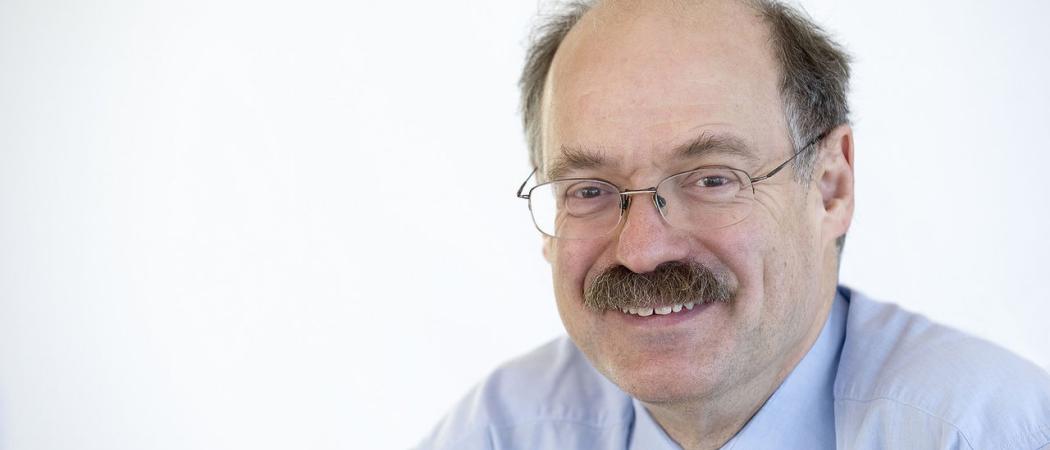Mark Walport, the most powerful figure in UK science, talks about maintaining a strong voice in the EU capital, and how to get it right on mission-led research

Photo: UK government, Department for Business, Energy and Industrial Strategy
Mark Walport, head of the UK’s national research funding agency UK Research and Innovation (UKRI), has vowed to play a “catalytic role” in global science collaboration after Brexit.
October 31 could be the day the UK and EU part company. As uncertainty around the date and terms of the UK’s departure grows, scientists in the UK are increasingly concerned about future access to funding, but also a potential loss of influence in Brussels.
“It is inevitable that [we] won’t have the same level of representation here after Brexit,” Walport told Science|Business. But, he says, he will continue to shuttle to Brussels to meet European counterparts. “An important part of my job is to play a catalytic role for science cooperation. I travel around to help make it easier for the UK to collaborate with all our partners abroad,” he said.
Walport was visiting Brussels this week to mark the anniversary of the UK Research Office (UKRO), which for 35 years has promoted the country’s R&D interests in Brussels. Following the formation of UKRI last year from the merger of all the UK research councils and the innovation agency Innovate UK, UKRO has now become UKRI’s European base.
Walport moved over from the post of UK government chief scientific advisor to become inaugural CEO of UKRI, and has oversight of more than £6 billion in research funding annually.
Whilst in Brussels Walport met EU Research Commissioner Carlos Moedas to discuss the shape of the EU’s 2021-2027 research programme, Horizon Europe, and to what extent the UK will be involved after Brexit. “The government position is very clearly to go for strong association [to the programme],” Walport said.
Currently, the UK receives around £850 million of research funding each year from the EU and Moedas has argued the scientific relationship needs to be protected, whatever the Brexit outcome. Tweeting after his meeting with Walport, Moedas said, “From a research and innovation perspective, a continued uninterrupted collaboration with the UK would be of clear benefit to both sides.”
Creating missions
One of UKRI’s roles is to help deliver the government's industrial strategy, which focuses on areas of particular scientific and technological strength.
As part of this, UKRI is running a new funding programme called the Industrial Strategy Challenge Funds, which is designed to pursue projects that present near term economic benefits for the UK. The EU is weighing a similar challenge-based approach with its research missions. As in the UK, officials in Brussels now have to figure out what areas of research to prioritise, and with what mix of government, academic and industry input.
The challenge approach, which funds collaborative research between industry and academia, targeted at priority technologies, is “more than simply letting the scientists loose,” Walport said.
Rather it is about creating new opportunities for cross-cutting topics in areas like disease detection, industrial decarbonisation and sustainable plastic packaging. “If you have a hard target, you need to provide a focus. You need to be able to do difficult things,” said Walport
Some £1.7 billion has already flowed through the first two rounds of the challenge funds, with industry expected to throw in a further £1 billion. The third round is expected to achieve even greater business involvement, with £1.50 of industry co-investment projected for every £1 of public money.
Walport rejects the suggestion that UKRI is dictating all the terms of the competition. Scientists and industry officials are coming forward with proposals all the time, he said.
“We’re learning that there’s undoubtedly an appetite for this way of funding. It’s natural, because in science we see people are working in teams more than ever before,” he said. UKRI emphasises that the funds have also helped spread resources beyond the golden triangle of London, Cambridge and Oxford, which receives a disproportionate amount of public R&D funding.
Moedas has made research missions a centrepiece of his agenda. Walport’s main advice to him is to take great care in setting them up.
The European Parliament and EU governments have agreed five themes for the missions – adapting to climate change; cancer; healthy oceans, seas, coastal and inland waters; smart, climate-neutral cities; and soil health and food – but the details still have to be agreed.
EU policymakers will be hard pressed to come up with a mission that matches landing on the moon and there is some scepticism from research watchers over whether there is enough time or money to come close to achieving the lofty goals being discussed.
But even smaller missions require a lot of craft, Walport said. “They are a lot of work. Leadership [for each mission] is important. They take a lot of development; they require people to change course if needed. They’re not trivial,” he said.
Fifteen member advisory boards, yet to be established, will set out route maps for each of the five EU mission areas. Does Walport hope talented individuals from the UK will feature? “If we want to be successful in Europe, you need a global approach,” he replied.
Walport is presiding over UKRI during a time of significant uplift in UK investment in science. In a bid to take some of the sting out of Brexit, the government aims to increase public and private spending on R&D from 1.7 per cent of GDP to 2.4 per cent by 2027. At the current rate of economic growth, this means an extra £6 billion.
One of the criticisms of amalgamating all the research councils and Innovate UK within UKRI is that the new structure puts a great deal of power in the hands of a single person. The vision has not found favour in all quarters, and UKRI’s moves are being watched closely.
UKRI is, “a big project, which will take time to fully develop, Walport said. But one year in, “We’ve learned to toddle, and it’s going very well,” he said.





 A unique international forum for public research organisations and companies to connect their external engagement with strategic interests around their R&D system.
A unique international forum for public research organisations and companies to connect their external engagement with strategic interests around their R&D system.